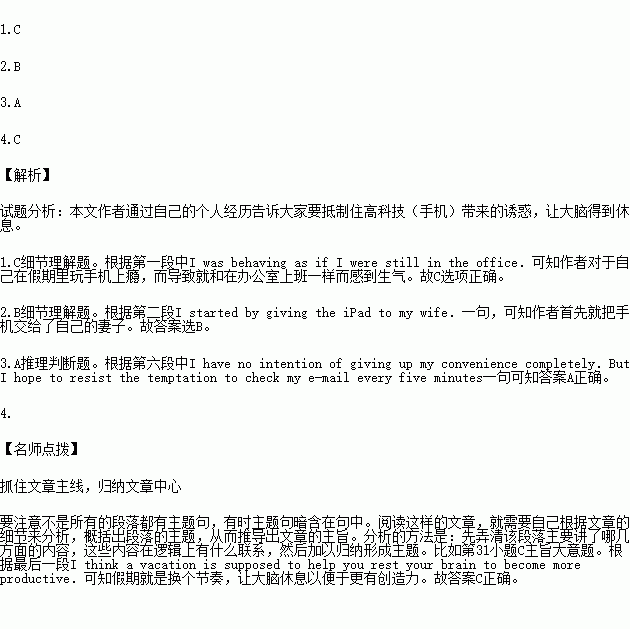题目内容
Last year my summer holiday was spoiled by my bringing along a modern convenience that was too convenient for my own good: the iPad. Instead of looking at nature, I checked my e-mail. Instead of paddling a small boat, I followed my Twitter feed(推特简讯). Instead of reading great novels, I stuck to reading four newspapers each morning. I was behaving as if I were still in the office. My body was on vacation, but my head wasn’t.
So this year I made up my mind to try something different: withdrawal from the Internet. I knew it wouldn’t be easy, since I’m bad at self-control. But I was determined. I started by giving the iPad to my wife.
The cellphone signal at our house was worse than in the past, making my attempts at cheating an experience in frustration (沮丧). I was trapped, forced to go through with my plan. Largely breaking away from e-mail, Twitter and my favorite newspaper websites, I had few ways to connect to the world except for the radio—and how much radio can one listen to, really? I had to do what I had planned to do all along: read books.
This experience has had a happy ending. With determination and the strong support of my wife, I won in my vacation struggle against the Internet, realizing finally that it was I, not the iPad, that was the problem. I knew I had won when we passed a Starbucks and my wife asked if I wanted to stop to use the Wi-Fi. “I don’t need it,” I said.
However, as we return to post-vacation life, a harder test begins: Can I continue when I’m back at work?
There are times when the need to know what’s being said right now is great. I have no intention of giving up my convenience completely. But I hope to resist the temptation to check my e-mail every five minutes, which leads to checking my Twitter feed and a website or two.
I think a vacation is supposed to help you rest your brain to become more productive. Here I hope this one worked.
1. What do we know about the author’s last summer vacation?
A. He was determined to enjoy the beautiful view.
B. His iPad ruined his plan of finishing a great novel.
C. He hated himself for acting as if he were working on vacation.
D. He felt satisfied that he had stuck to his usual timetable.
2.What did the author do to keep away from the Internet this year?
A. He cut off his cellphone signal.
B. He handed his iPad to his wife.
C. He refused to cheat in his house.
D. He listened to the radio most of the time.
3. When back at work, the author will probably choose to ________.
A. keep control of when and how to use the Internet
B. continue to road more and more books
C. stay away from the Internet for ever
D. stop checking what is being said right now completely
4.What is the author’s opinion of a great vacation in the passage?
A. A vacation is having nothing to do but read all day.
B. A vacation proves that a life of pleasure is overvalued.
C. A vacation means a change of pace to make one more creative.
D. A vacation is a period of time to do whatever one wishes to.


 ),并在其下面写出该加的词。
),并在其下面写出该加的词。